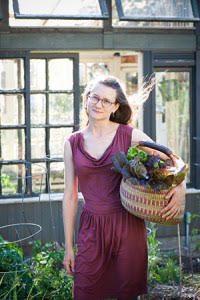Organic Alternatives to Pesticides
Sunday, April 30th || 10:00am – 4:00 pm
Trillium Charter School || 5420 N Interstate Ave, Portland, OR 97217
One Day, $55 || Space is limited
Did you know that 90 million pounds of herbicide are sprayed on lawns in a single year, nationally?* Did you know that companies are not required to reveal all of the ingredients in these products? There is growing concern for the health of both humans and wildlife – including pollinators – when it comes to herbicides like Round-Up, which is widely used in parks and other public spaces for vegetation management. Many people and groups are working to reduce pesticide use and exposure in food, farms, forests, schools, and parks. In this workshop, we’ll be talking about how to design and implement pesticide-free management of public spaces. Other cities have already caught on. Seattle and Eugene have pesticide free parks, several towns including Takoma Park, MD are pesticide free and 171 Canadian municipalities** have enacted ordinances to protect public health and the environment from pesticides. Empower yourself and others with the knowledge necessary to build a citizen-led movement to reduce toxic pesticide use.
In this workshop, we will discuss the current state of pesticide regulation, and learn how citizens can take action to steward the spaces where we, our children, our pets, as well as birds, bees, and other wildlife, access nature in our neighborhoods – without pesticides. Organic management is based on principles of understanding living systems, and this workshop will focus on how these principles can be applied on any scale. Join us for this exciting day of education and action toward meaningful citizen stewardship of our common resources.
*Source http://www.beyondpesticides.org/assets/media/documents/lawn/factsheets/LAWNFACTS&FIGURES_8_05.pdf
**Source https://en.wikipedia.org/wiki/Pesticides_in_Canada
Instructors:
 Tao Orion is the author of Beyond the War on Invasive Species: A Permaculture Approach to Ecosystem Restoration. She teaches permaculture design at Oregon State University and at Aprovecho, a 40-acre nonprofit sustainable-living educational organization. Tao consults on holistic farm, forest, and restoration planning through Resilience Permaculture Design, LLC. She holds a degree in agroecology and sustainable agriculture from UC Santa Cruz, and grows organic fruits, vegetables, seeds, nuts, and animals on her southern Willamette Valley homestead, Viriditas Farm.
Tao Orion is the author of Beyond the War on Invasive Species: A Permaculture Approach to Ecosystem Restoration. She teaches permaculture design at Oregon State University and at Aprovecho, a 40-acre nonprofit sustainable-living educational organization. Tao consults on holistic farm, forest, and restoration planning through Resilience Permaculture Design, LLC. She holds a degree in agroecology and sustainable agriculture from UC Santa Cruz, and grows organic fruits, vegetables, seeds, nuts, and animals on her southern Willamette Valley homestead, Viriditas Farm.
 Mulysa Melco is a landscape designer and horticulturist in Portland, OR. Through Resilience Design, her sustainable landscape design and consultation studio, she facilitates urban and rural site design and ecological restoration projects. These ‘homesteads and habitats’ are multifunctional spaces that aim to foster reconnection between people and our ecosystems. She teaches workshops on botany, permaculture and ecological living skills. Mulysa has a BFA from the Minneapolis College of Art and Design and a Master of Agriculture in Horticulture degree (focusing on landscape design and garden history) from the University of Minnesota – Twin Cities. She interned at the Royal Botanic Gardens Kew in England. In 2014 Mulysa spoke at the National Pesticide Forum about her neighborhood’s campaign to become a pesticide free zone.
Mulysa Melco is a landscape designer and horticulturist in Portland, OR. Through Resilience Design, her sustainable landscape design and consultation studio, she facilitates urban and rural site design and ecological restoration projects. These ‘homesteads and habitats’ are multifunctional spaces that aim to foster reconnection between people and our ecosystems. She teaches workshops on botany, permaculture and ecological living skills. Mulysa has a BFA from the Minneapolis College of Art and Design and a Master of Agriculture in Horticulture degree (focusing on landscape design and garden history) from the University of Minnesota – Twin Cities. She interned at the Royal Botanic Gardens Kew in England. In 2014 Mulysa spoke at the National Pesticide Forum about her neighborhood’s campaign to become a pesticide free zone.
Registration:
Organic Alternatives to Pesticides
Sunday, April 30th || 10:00am – 4:00 pm
Trillium Charter School || 5420 N Interstate Ave, Portland, OR 97217
One Day, $55 || Space is limited
Did you know that 90 million pounds of herbicide are sprayed on lawns in a single year, nationally?* Did you know that companies are not required to reveal all of the ingredients in these products? There is growing concern for the health of both humans and wildlife – including pollinators – when it comes to herbicides like Round-Up, which is widely used in parks and other public spaces for vegetation management. Many people and groups are working to reduce pesticide use and exposure in food, farms, forests, schools, and parks. In this workshop, we’ll be talking about how to design and implement pesticide-free management of public spaces. Other cities have already caught on. Seattle and Eugene have pesticide free parks, several towns including Takoma Park, MD are pesticide free and 171 Canadian municipalities** have enacted ordinances to protect public health and the environment from pesticides. Empower yourself and others with the knowledge necessary to build a citizen-led movement to reduce toxic pesticide use.
In this workshop, we will discuss the current state of pesticide regulation, and learn how citizens can take action to steward the spaces where we, our children, our pets, as well as birds, bees, and other wildlife, access nature in our neighborhoods – without pesticides. Organic management is based on principles of understanding living systems, and this workshop will focus on how these principles can be applied on any scale. Join us for this exciting day of education and action toward meaningful citizen stewardship of our common resources.
*Source http://www.beyondpesticides.org/assets/media/documents/lawn/factsheets/LAWNFACTS&FIGURES_8_05.pdf
**Source https://en.wikipedia.org/wiki/Pesticides_in_Canada
Instructors:
Registration: